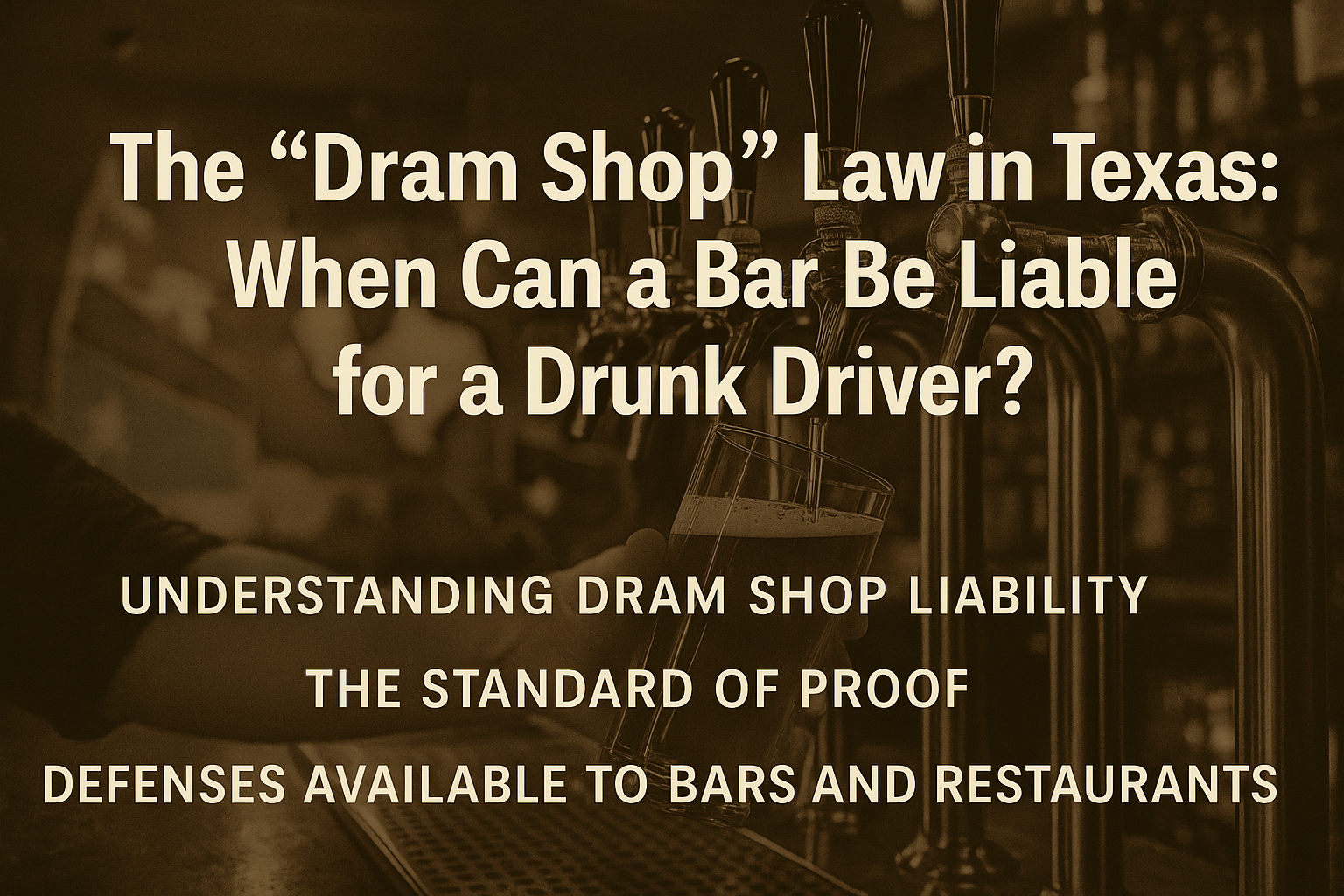
Under Texas law, the aftermath of a drunk-driving accident can extend beyond the driver who got behind the wheel. In certain cases, a bar, restaurant, or other alcohol-serving establishment can be held civilly liable under the Texas Dram Shop Act — Texas Alcoholic Beverage Code Chapter 2.
Understanding Dram Shop Liability
The Dram Shop Act provides that a provider of alcohol may be liable for damages caused by an intoxicated person if:
- It was apparent to the provider at the time of service that the individual was obviously intoxicated to the extent that they presented a clear danger to themselves and others; and
- The intoxication was a proximate cause of the damages suffered.
In other words, the law imposes a duty on establishments to stop serving alcohol to patrons who are clearly drunk — not just mildly impaired — when their continued consumption poses a foreseeable risk.
The Standard of Proof
Like most civil claims in Texas, Dram Shop liability cases are governed by the “preponderance of the evidence” standard. This means the plaintiff must show that it is more likely than not that the bar or restaurant’s overservice caused or contributed to the accident.
This standard contrasts sharply with the “beyond a reasonable doubt” standard used in criminal DWI prosecutions. The Dram Shop Act does not require proof of criminal culpability — only that the defendant’s conduct tipped the scales slightly in favor of liability.
To meet this burden, plaintiffs often rely on:
- Witness testimony (e.g., servers, bartenders, other patrons) about the patron’s visible intoxication;
- Surveillance footage showing slurred speech, stumbling, or obvious impairment;
- Receipts and time stamps showing how much alcohol was served and over what period;
- Expert toxicology evidence linking the amount served to blood alcohol concentration (BAC) levels; and
- Law enforcement reports documenting the driver’s condition shortly after leaving the establishment.
Defenses Available to Bars and Restaurants
A provider can assert the “Safe Harbor Defense” under §106.14(a) of the Alcoholic Beverage Code. To succeed, the establishment must prove that:
- It required employees to attend an approved seller-training program;
- The employee in question actually attended and was certified; and
- The employer did not directly or indirectly encourage the violation (i.e., overservice).
If proven, this defense can shield the business even if the employee served someone who was visibly intoxicated.
Practical Implications
Because the standard of proof is relatively low — just “more likely than not” — cases often hinge on credibility and evidence qualityrather than quantity. Still, plaintiffs face challenges: jurors must be persuaded that the server could actually tell the patron was dangerously drunk at the moment of service, not merely that the person later caused an accident.
Bars, meanwhile, should keep comprehensive training records, surveillance footage, and service policies to demonstrate compliance and potentially invoke Safe Harbor protection.
Key Takeaway
In Texas, a bar’s liability under the Dram Shop Act doesn’t depend on criminal conviction or high evidentiary thresholds. The plaintiff only needs to show — by a preponderance of the evidence — that the establishment overserved an obviously intoxicated patron and that this overservice contributed to the resulting harm.
At David C. Barsalou, Attorney at Law, PLLC, we help clients navigate business, family, tax, estate planning, and real estate matters ranging from document drafting to litigation with clarity and confidence. If you’d like guidance on your situation, schedule a consultation today. Call us at (713) 397-4678, email barsalou.law@gmail.com, or reach us through our Contact Page. We’re here to help you take the next step.